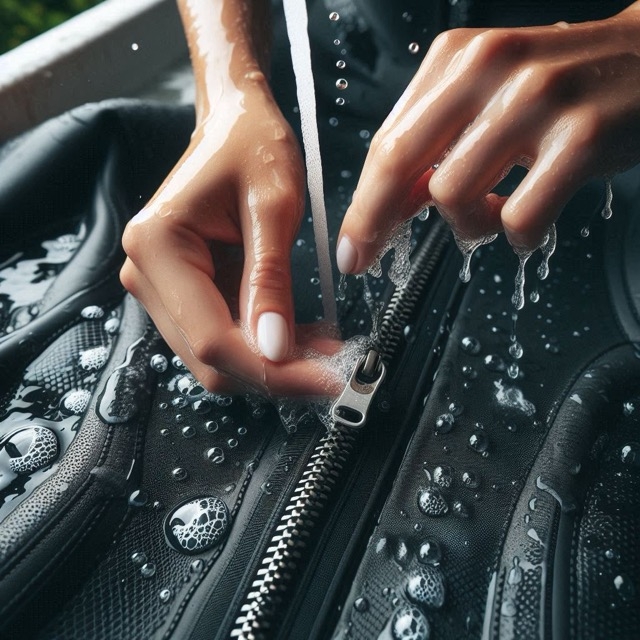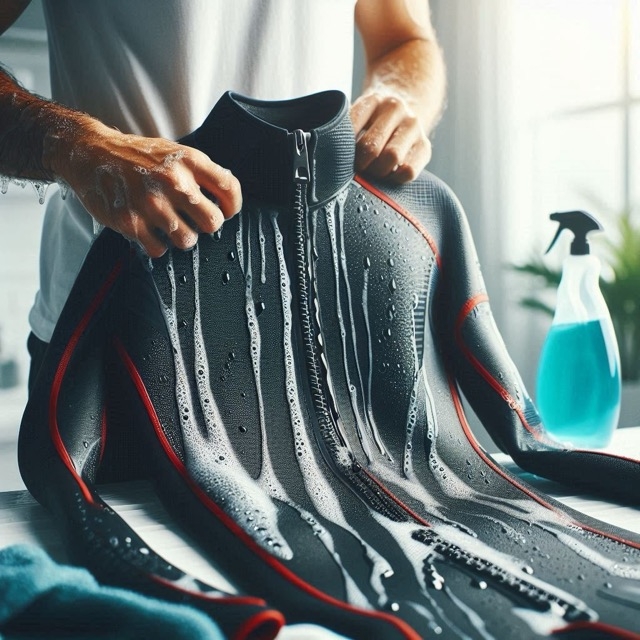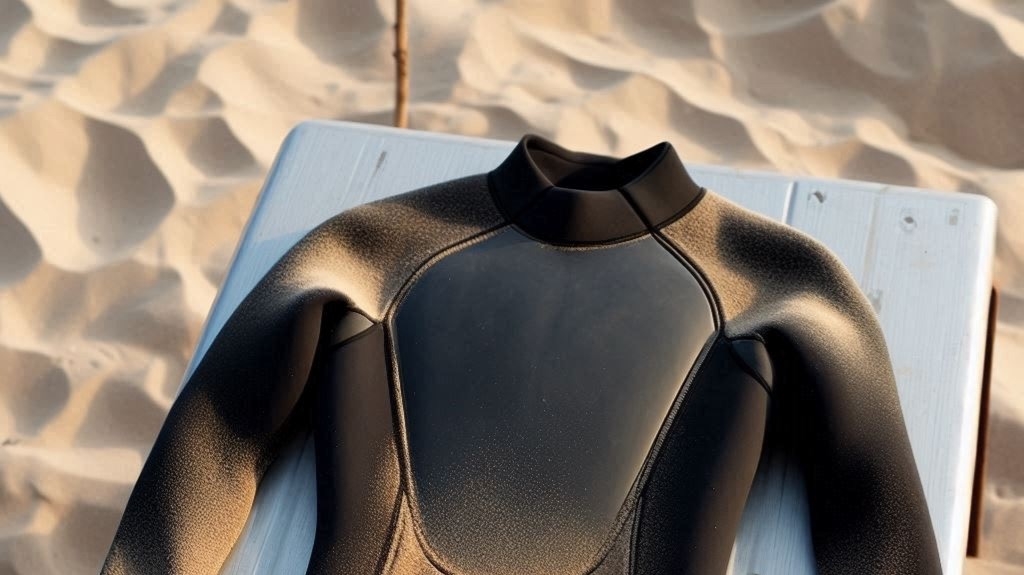How to Clean a Wetsuit in 6 Steps
Learn easy steps to keep your wetsuit fresh, functional, and long-lasting for all your dives.
As a diver, our wetsuit is like our second skin underwater. It's a shield against the cold, and our constant friend on every diving experience. But like any faithful friend, wetsuit needs some TLC to stay in top shape. Let's dive into the basics of keeping your wetsuit clean, fresh, and ready for your next dive!

Why Bother Cleaning Your Wetsuit?
You might be thinking, "It's always in water anyway, so why clean it?" Well, my fellow dive enthusiast, there's more to it than meets the eye. Here's why you should make wetsuit cleaning a priority:
Banish the Funk: Let's face it, wetsuits can get pretty funky. Sweat, body oils, and the occasional "oops" moment can leave your suit smelling less than fresh. Regular cleaning keeps those odors at bay.
Say Goodbye to Grit: Sand, salt, and tiny debris can work their way into the neoprene, causing irritation and potentially damaging the suit over time.
Maintain Flexibility: A clean suit is a flexible suit. Build-up of salt and minerals can make your wetsuit stiff and less comfortable to wear.
Extend Its Lifespan: Proper care can significantly extend the life of your wetsuit, saving you money in the long run.
Hygiene Matters: A clean suit is less likely to harbor bacteria or fungus, keeping your skin happy and healthy.
How Often Should You Clean Your Wetsuit?
The frequency of cleaning depends on how often you're hitting the water. Here's a general guideline:
After Every Dive: Give your suit a thorough rinse with fresh water. This quick step goes a long way in preventing salt and sand build-up.
Every 2-3 Uses: Time for a more thorough cleaning, especially if you've been diving in particularly murky or salty waters.
When It Starts to Smell: If your suit is developing an odor, it's definitely time for a deep clean.
Before Storage: Always clean your suit before storing it away for an extended period.
The Step-by-Step Process to Cleaning Your Wetsuit
1. The Post-Dive Rinse
Give your suit a good rinse as soon as you're out of the water. Here's how:
Use cool or lukewarm fresh water. Hot water is a no-go as it can damage the neoprene.
Pay extra attention to zippers, seams, and any velcro areas. These spots love to trap sand and salt.
If you can't rinse it immediately, keep it damp until you can. A dry, salty suit is harder to clean later.

2. Preparing for a Deep Clean
When it's time for a more thorough cleaning, here's what you'll need:
A large tub or bathtub
Wetsuit shampoo or a mild, unscented soap (avoid harsh detergents)
A soft sponge or cloth
A wetsuit hanger or something similar
3. The Soaking Process
Time to give your suit a bath:
Fill your tub with cool or lukewarm water.
Add the recommended amount of wetsuit shampoo or a small amount of mild soap.
Turn your suit inside out and submerge it in the water.
Gently agitate the water to help the cleaning solution penetrate the neoprene.
Let it soak for about 15-20 minutes.
4. The Scrub Down
Now for some hands-on action:
Use a soft sponge or cloth to gently clean the entire suit.
Pay extra attention to areas that tend to get extra smelly or dirty, like the armpits, crotch, and knees.
Be gentle! Scrubbing too hard can damage the neoprene.
5. Rinse, Rinse, and Rinse Again
Thorough rinsing is crucial:
Drain the soapy water and refill with clean, cool water.
Rinse the suit thoroughly, making sure to remove all soap residue.
Keep rinsing until the water runs clear and you don't see any more suds.
6. Drying Your wetsuit
Proper drying is key to preventing mildew and odors:
Gently squeeze out excess water. Don't wring or twist the suit as this can damage the neoprene.
Hang the suit on a wide, padded hanger. Avoid wire hangers as they can stretch out the shoulders.
Keep it inside out initially to allow the interior to dry first.
Choose a well-ventilated area away from direct sunlight and heat sources.
Once the inside is dry, turn it right-side out to dry the exterior.
The Do's and Don'ts of Wetsuit Care
Do's:
Use specialized wetsuit cleaners or mild, unscented soap for best results.
Clean your wetsuit in cool or lukewarm water to protect the neoprene.
Rinse thoroughly after cleaning to remove all soap residue.
Allow the suit to dry completely before storage to prevent mildew.
Zip up the suit before hanging to maintain its shape.

Don'ts:
Avoid machine washing or drying, as this can damage the suit's structure.
Never use harsh chemicals, regular detergents, or fabric softeners.
Steer clear of dry cleaning - the chemicals used can ruin your suit.
Don't leave your suit in direct sunlight for extended periods when drying.
Avoid folding or compressing the suit for long periods during storage.
Dealing with Odors
Sometimes, despite your best efforts, your wetsuit might develop a stubborn smell. Don't worry, we've got some tricks up our sleeve:
The Vinegar Soak: Mix equal parts water and white vinegar in a tub. Soak your suit for about 15-20 minutes, then rinse thoroughly with fresh water. The vinegar helps neutralize odors.
Baking Soda Boost: After cleaning, sprinkle some baking soda inside the suit and let it sit overnight. Shake it out and rinse before your next use. Baking soda is great at absorbing odors.
Enzymatic Cleaners: For really tough smells, consider using an enzymatic cleaner designed for wetsuits. These cleaners break down the organic compounds causing the odor.
Lemon Fresh: Add a squeeze of lemon juice to your cleaning solution. The citric acid can help neutralize odors and leave your suit smelling fresh.
Storing Your Wetsuit: A Home Away From Home
Proper storage is just as important as cleaning when it comes to maintaining your wetsuit:
Ensure the suit is completely dry before storing to prevent mildew growth.
Hang it on a wide, padded hanger in a cool, dry place.
Avoid folding or compressing the suit for long periods to prevent creases and damage to the neoprene.
Keep it away from direct sunlight and heat sources, which can degrade the neoprene over time.
If you're storing for an extended period, consider turning it inside out every few months to air out both sides.
Dealing with Stains and Discoloration
Sometimes, your underwater adventures might leave more than just memories on your wetsuit. Here's how to tackle common stains:
Rust Stains: Mix a paste of lemon juice and salt. Gently rub it on the stain, let it sit for a few minutes, then rinse thoroughly.
Algae or Green Stains: Soak the affected area in a mixture of water and white vinegar for about an hour before washing as usual.
Sunscreen Marks: Use a mixture of baking soda and water to create a paste. Gently rub it on the stain, let it sit for a few minutes, then wash normally.
Remember, always test any stain removal method on a small, inconspicuous area first to ensure it doesn't damage or discolor your suit.

Maintaining Zippers and Seals
The zippers and seals on your wetsuit are crucial for its functionality. Here's how to keep them in top shape:
After each use, rinse zippers thoroughly with fresh water to remove salt and sand.
Regularly lubricate zippers with a silicone-based lubricant to keep them running smoothly.
Check seals for any signs of wear or damage. Small tears can often be repaired with neoprene cement.
Avoid pulling on seals when putting on or taking off your suit to prevent stretching or tearing.
Repairing Minor Damages
Small nicks and tears don't have to mean the end of your wetsuit. Here are some quick fixes:
For small holes or tears, use a neoprene cement or a wetsuit repair kit.
Clean and dry the area thoroughly before applying any repairs.
For larger damages, consider taking your suit to a professional for repair.
Eco-Friendly Cleaning Options
For the environmentally conscious diver, here are some green cleaning alternatives:
Use biodegradable, phosphate-free soaps specifically designed for wetsuits.
Try natural alternatives like diluted white vinegar or a baking soda paste for cleaning and odor removal.
Opt for reusable microfiber cloths instead of disposable wipes when cleaning your suit.
The Impact of Different Water Types on Your Wetsuit
Different diving environments can affect your suit in various ways:
Saltwater: More likely to leave mineral deposits that can stiffen your suit. Thorough rinsing is extra important after saltwater dives.
Freshwater: Generally less harsh on your suit, but can still harbor bacteria if not cleaned properly.
Chlorinated Pools: The chlorine can degrade the neoprene over time. Rinse extra thoroughly after pool dives.
When to Replace Your Wetsuit
Even with the best care, wetsuits don't last forever. Here are signs it might be time for a new one:
The neoprene has become thin or overly stretched.
There are large tears or holes that can't be effectively repaired.
The suit no longer keeps you warm due to loss of insulation.
Zippers or seals are beyond repair.
Conclusion: A Clean Suit is a Happy Suit
Taking care of your wetsuit might seem like a chore, but it's a small price to pay for the amazing underwater experiences it enables. Regular cleaning and proper maintenance will not only extend the life of your suit but also ensure that it performs at its best, keeping you comfortable and protected dive after dive.
Remember, a well-maintained wetsuit is more than just a piece of equipment - it's your ticket to exploring the wonders of the underwater world. So give it the care it deserves, and it'll take care of you on every dive.
Happy diving, and here's to many more adventures with your clean, fresh, and functional wetsuit!

FAQ
How often should I clean my wetsuit?
Rinse your wetsuit with fresh water after every use. Give it a thorough cleaning every 2-3 uses or when it starts to smell. Always clean it before storing it away for an extended period.
Can I machine wash my wetsuit?
No, machine washing can damage your wetsuit's structure. Always hand wash your wetsuit in cool or lukewarm water using a mild soap or specialized wetsuit cleaner.
What's the best way to dry my wetsuit?
Hang your wetsuit on a wide, padded hanger in a well-ventilated area away from direct sunlight and heat sources. Turn it inside out initially to dry the interior first, then right-side out to dry the exterior.
How can I remove stubborn odors from my wetsuit?
Try soaking your wetsuit in a mixture of equal parts water and white vinegar for 15-20 minutes, then rinse thoroughly. Alternatively, you can use baking soda or an enzymatic cleaner designed for wetsuits.
Is it safe to use regular laundry detergent on my wetsuit?
No, regular laundry detergents are too harsh and can damage the neoprene. Use a specialized wetsuit shampoo or a mild, unscented soap instead.
How do I clean the zipper on my wetsuit?
Rinse the zipper thoroughly with fresh water after each use to remove salt and sand. Regularly lubricate it with a silicone-based lubricant to keep it running smoothly.
How can I understand if it's time to replace my wetsuit?
Consider replacing your wetsuit when the neoprene becomes thin or overly stretched, there are large tears or holes that can't be effectively repaired, it no longer keeps you warm, or the zippers and seals are beyond repair.

I'm a scuba enthusiast, and marine life lover. I enjoy writing about my diving adventures and sharing my knowledge with others.

I'm a passionate scuba diver and love to share my experiences with you. I enjoy writing about my experiences and sharing my knowledge with others.